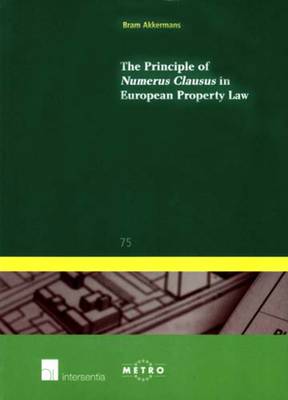
- Retrait gratuit dans votre magasin Club
- 7.000.000 titres dans notre catalogue
- Payer en toute sécurité
- Toujours un magasin près de chez vous
- Retrait gratuit dans votre magasin Club
- 7.000.0000 titres dans notre catalogue
- Payer en toute sécurité
- Toujours un magasin près de chez vous
132,00 €
+ 264 points
Description
In order to develop a framework that can form a basis for the development of a European property law, this book provides a comparative analysis of property law from the perspective of four European legal systems and European law, focusing on the numerus clausus principle. The book offers theoretical insights on how substantive property law, European law, and, to a certain extent, private international law intersect. The principle of numerus clausus, one of the fundamental principles of property law, is adhered to by most legal systems. In this book, an analysis of the property law systems of France, Germany, the Netherlands, and England is provided. A description is given of the content of available property rights in each of these systems, followed by an examination as to whether these rights form a closed system and whether private parties are given freedom to shape property rights, or even create new types of rights. In the last decades, property law has come under pressure to allow more party autonomy. In other words, property law has become more and more subject to pressure from contract law. Private parties attempt to draft their contracts in such a way that their contractual arrangements are given property effect. Sometimes they also attempt to make use of a property right in a way that was not foreseen by legislature or courts. As a result, rights have come into existence that are intermediary between the law of contract and the law of property. Moreover, the systems of property law are also subject to a growing influence from European legislation. The development of the internal market in the European Union increasingly forces Member States to answer the question whether and, if the answer is affirmative, in what way property rights created in another Member State should be recognized. Substantive property law intersects here. Until now, national legal systems generally resist this influence of European law and use the principle of numerous clausus as a justification. It is to be questioned whether the numerus clauses principle can still act as a guardian against the influence of foreign and European law.
Spécifications
Parties prenantes
- Auteur(s) :
- Editeur:
Contenu
- Nombre de pages :
- 657
- Langue:
- Anglais
- Collection :
Caractéristiques
- EAN:
- 9789050958240
- Date de parution :
- 18-10-08
- Format:
- Livre broché
- Format numérique:
- Trade paperback (VS)
- Dimensions :
- 172 mm x 236 mm
- Poids :
- 1179 g

Les avis
Nous publions uniquement les avis qui respectent les conditions requises. Consultez nos conditions pour les avis.






